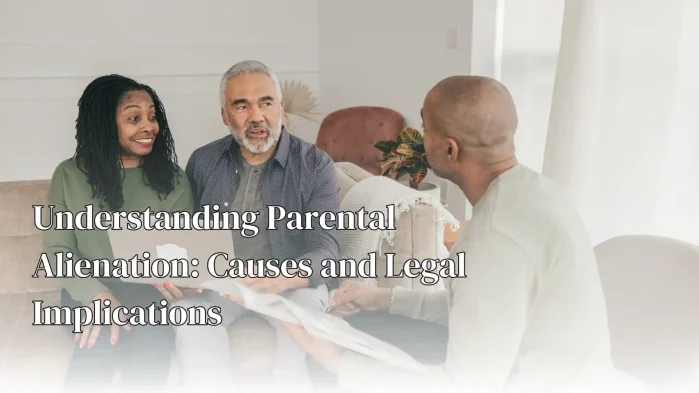
Allowing children to become caught in parental conflicts is one of the most serious pitfalls of going through a divorce or separation. While most parents recognize the importance of maintaining healthy relationships between children and both parents, some situations develop where one parent deliberately or unconsciously undermines the child’s relationship with the other parent. This behavior, known as parental alienation, carries serious legal and emotional consequences that family law courts take very seriously—making it essential to understand the parental alienation legal implications involved.
What Is Parental Alienation?
Parental alienation happens when one parent takes deliberate steps to turn a child against the other parent through various forms of psychological manipulation. This process often involves subtle or overt criticism, false allegations, or emotional manipulation designed to damage the child’s relationship with the targeted parent. While it’s normal for children sometimes to have preferences—or even occasionally resist visitation—parental alienation is an ongoing behavior pattern that fundamentally alters a child’s relationship with one parent, raising the question: what are the legal implications of parental alienation in custody cases?
Children who experience parental alienation often display several disconcerting behaviors. They might:
- Express intense negativity toward one parent without reasonable justification
- Refuse to spend time with the suspect of parental alienation
- Repeat adult language and concepts when discussing their feelings
- Show unwavering support for the alienating parent while demonstrating little to no guilt about rejecting the other parent.
The psychological effects on children can be devastating. Mental health professionals recognize parental alienation as a form of child psychological abuse that can lead to long-term emotional difficulties, including depression, anxiety, and problems forming healthy relationships later in life. The targeted parent also suffers significant emotional harm from losing meaningful contact with their child, but just as important is the impact of parental alienation on children, who may struggle with confusion, guilt, and long-term emotional issues.
Is Parental Alienation Illegal?
New Jersey family law does not explicitly criminalize parental alienation as a standalone offense. However, many behaviors associated with parental alienation violate existing custody orders and family law statutes. When a parent deliberately prevents the other parent from exercising their court-ordered custody or visitation rights, they commit visitation interference, which courts can address through various legal mechanisms.
Family law courts evaluate parental alienation cases within the broader framework of the child’s best interest standard. Judges recognize that children tend to do best when they maintain healthy relationships with both parents. As such, they view attempts to get in the way of these relationships as detrimental to a child’s welfare.
What Are the Legal Consequences of Parental Alienation?
Parents who engage in alienating behaviors face several potential legal consequences. Family law courts can hold violating parents in contempt of court when their actions directly contradict existing custody orders. This contempt finding can result in sanctions, fines, or community service requirements. In extreme situations, jail time might be a possibility. Additionally, making false allegations against the other parent to support alienation efforts can potentially result in perjury charges—just one example of how parental alienation can result in costly consequences, both legally and emotionally.
Courts may also modify existing custody decision arrangements when it is evident that parental alienation is occurring. These custody modifications can involve:
- Reducing the alienating parent’s parenting time
- Changing primary residential arrangements
- Implementing supervised visitation requirements
- Requiring attendance at parenting classes or participation in counseling
Financial consequences often accompany parental alienation findings. Courts may order the alienating parent to pay the other parent’s attorney fees and court costs. Additionally, they might require payment for therapeutic services, including individual counseling for the child and reunification therapy to repair damaged parent-child relationships.
What Are the Legal Remedies and Court Actions for Parental Alienation?
 Several legal remedies exist for parents experiencing alienation from their children. One option is to seek a custody modification, particularly when the alienating parent has made a habit of violating existing parenting plans.
Several legal remedies exist for parents experiencing alienation from their children. One option is to seek a custody modification, particularly when the alienating parent has made a habit of violating existing parenting plans.
Another potential remedy is reunification therapy, which focuses on rebuilding the relationship between the alienated parent and child. Courts often order reunification therapy when evidence demonstrates parental alienation, and they may suspend the alienating parent’s contact with the child during this therapeutic process.
Some cases benefit from appointing a court-appointed guardian ad litem to represent the child’s interests independently. These legal advocates can objectively investigate the family situation and recommend custody arrangements and therapeutic interventions to the court.
Contact an Experienced New Jersey Custody Attorney Today
Parents who are in parental alienation situations should document all relevant incidents and seek professional help promptly. Working with experienced divorce and family law attorneys in New Jersey ensures that parents understand their legal options and can take appropriate action to protect their parental rights.
If you believe parental alienation affects your relationship with your child, The Law Office of Andrew A. Bestafka, Esq. can help you understand your legal options. Our team will work toward protecting your parental rights. Contact our office at (732) 898-2378 to discuss your situation and explore potential remedies.
